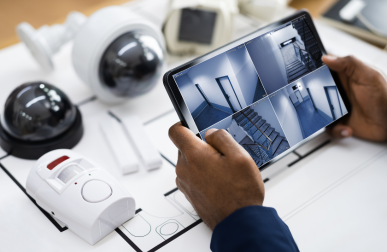By Tensor Security | Sydney, Australia
When setting up a CCTV security system, one of the first questions people ask is:
“What’s the difference between an NVR and a DVR?”
Both are used to record and store video footage, but the way they work—and the type of cameras they support—is very different. Choosing the right system depends on your needs, your budget, and the type of property you’re securing.
What is a DVR?
DVR stands for Digital Video Recorder.
A DVR system works with analogue security cameras (typically coaxial cable) and records footage by digitising the video signal at the recorder itself.
Key Features of DVR Systems:
- Uses coaxial cables for camera connections
- Records standard or high-definition video (depending on camera)
- Cameras are typically less expensive
- Limited to wired connections
- Audio support may require separate cables
- Less flexible for future upgrades
Pros:
- Cost-effective for smaller systems
- Simple installation (especially for upgrades to existing analogue setups)
Cons:
- Bulkier cables
- Lower resolution and frame rate compared to modern systems
- Limited remote access and smart features
What is an NVR?
NVR stands for Network Video Recorder.
An NVR system works with IP cameras (Internet Protocol) that capture and encode video at the camera level. The NVR simply stores the footage and often provides more advanced management features.
Key Features of NVR Systems:
- Works over standard network cabling (Cat5e or Cat6)
- Typically supports Power over Ethernet (PoE) – one cable for power and data
- Higher resolution (HD, 4K, etc.)
- More flexible camera placement (wired or wireless)
- Easier to scale and upgrade
- Advanced features: facial recognition, motion zones, alerts
Pros:
- Crystal-clear video quality
- Simplified wiring with PoE
- More modern and scalable
- Easier remote access via apps or web interfaces
Cons:
- Slightly higher upfront cost
- Requires basic networking knowledge for setup
Which One is Right for You?
| Feature | DVR | NVR |
|---|---|---|
| Camera Type | Analogue | IP (Digital) |
| Cable Type | Coaxial | Ethernet (Cat5e/Cat6) |
| Video Quality | Standard to HD | HD to 4K+ |
| Power Supply | Separate cable | PoE (single cable for both) |
| Remote Access | Basic | Advanced & user-friendly |
| Expandability | Limited | Scalable |
| Best For | Budget-friendly systems | Modern, high-performance systems |
Our Recommendation
If you’re starting fresh, we almost always recommend an NVR system. It offers better video quality, simpler installation (especially with PoE), and far more flexibility for the future.
However, if you’re upgrading an older analogue system and want to keep costs down, a DVR system may be the more economical choice—especially for small-scale setups.
Need Help Deciding?
The team at Tensor Security is here to help you choose the best surveillance system for your home or business. We supply both NVR and DVR kits and can walk you through the pros and cons based on your specific needs.
Phone: 1300 737 998
Address: Suite 1, 220 The Entrance Rd, Erina NSW
Website: www.tensor.com.au

